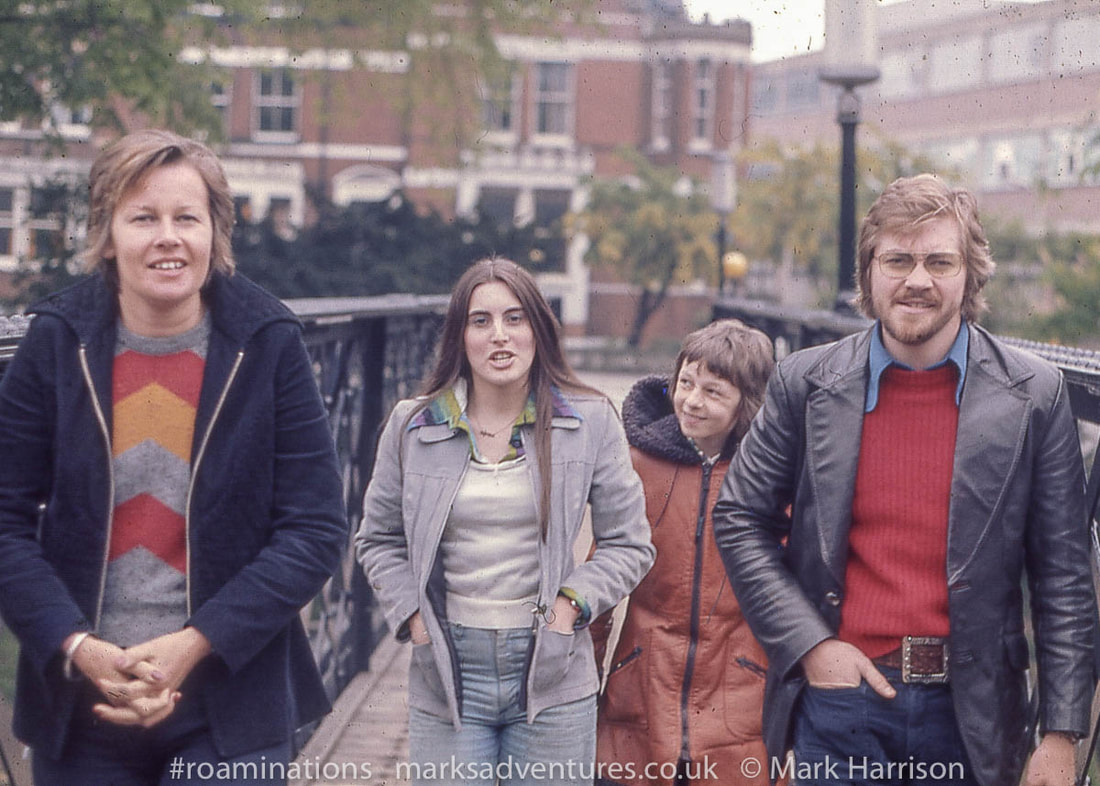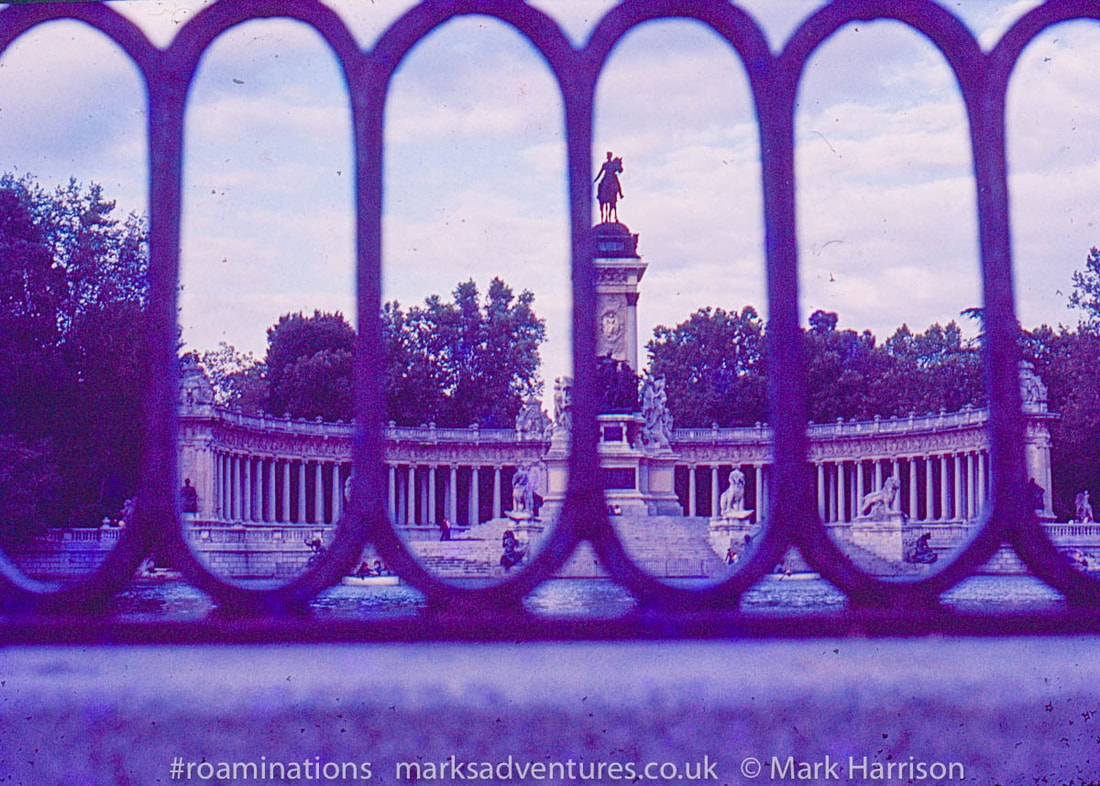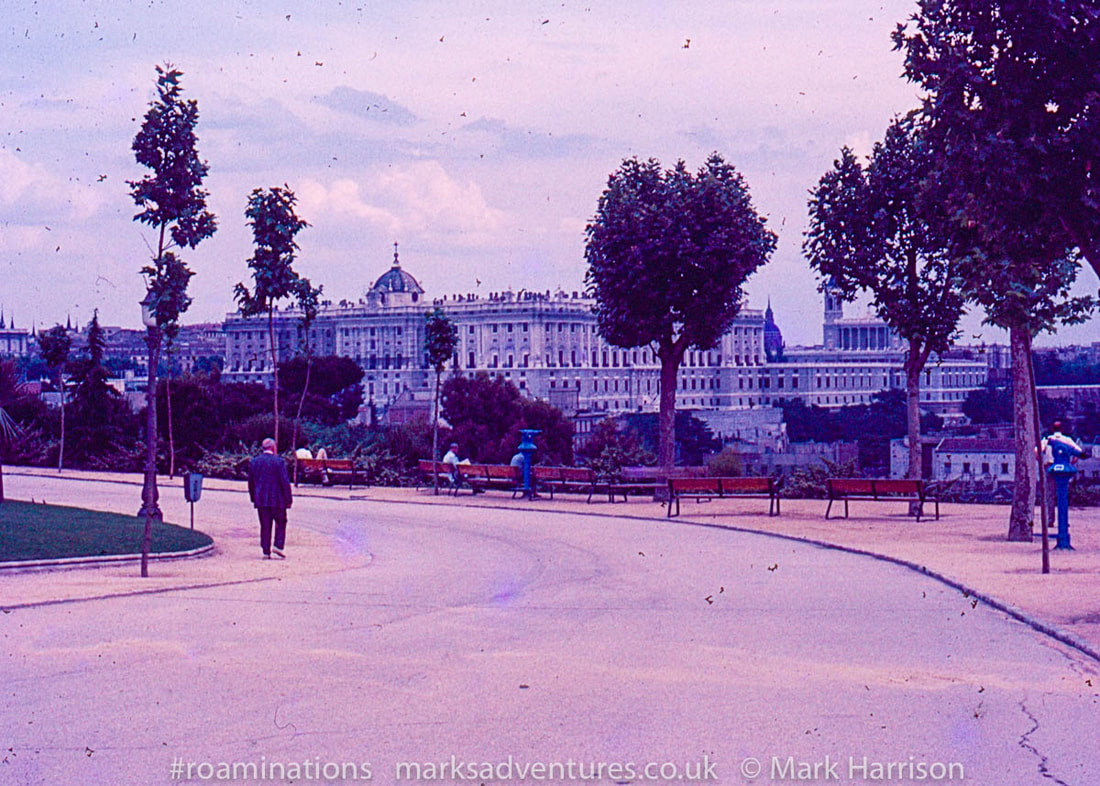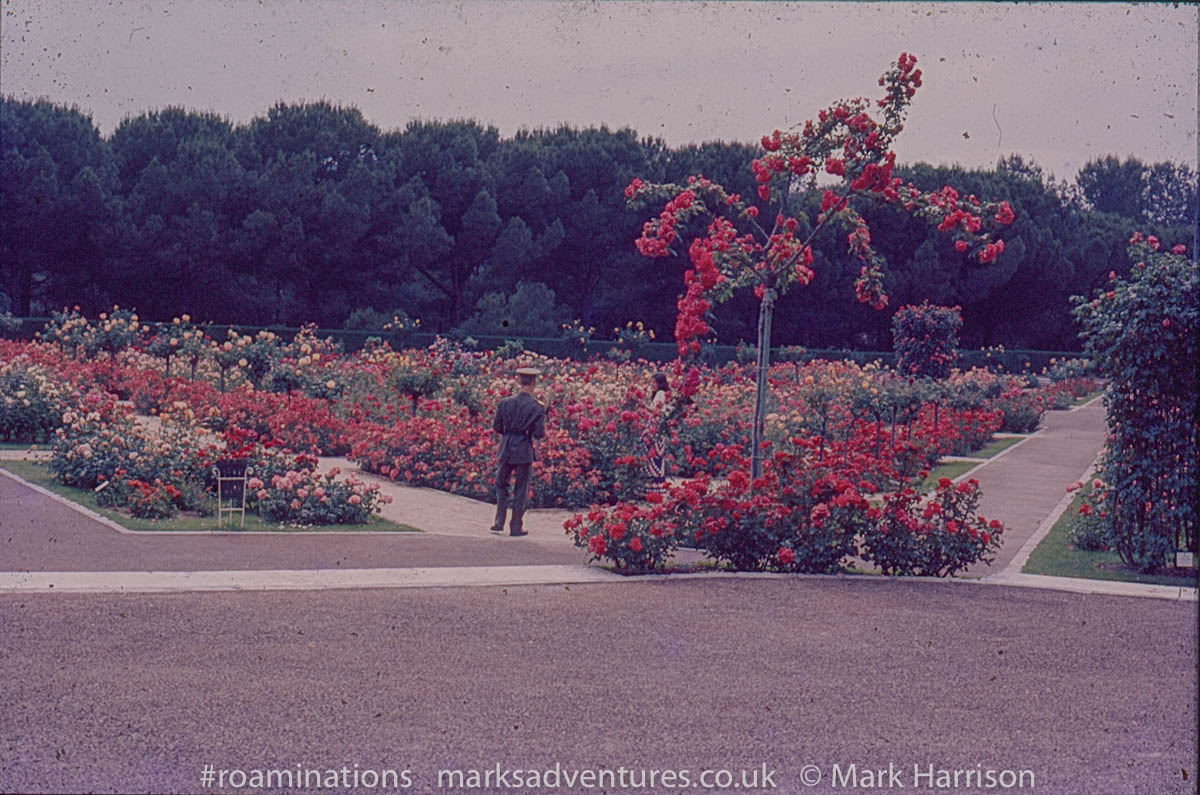|
If Acts 1 & 2 arranged themselves around friends and colleagues and characters at 85 Fleet Street, this one picks up a few scenes from when we were allowed out of the building to pursue some live stories. These stories were not always live for the originally intended news rationale: Hopefully the four scenes below will be self explanatory. But first, a gratuitous picture as a scene-setter for summer 1975.  The Venters were a significant influence in our summer of '75 ... including holidaying together on the continent in their Kombi. Here Carmela gets to know (from l to r) Susi, herself, Cornelia and Lester. Lester Venter meets Joshua Nkomo This is not really a story about Joshua Nkomo. Mr Nkomo was one of the foremost politicians in Southern Africa at that time. He founded and led the Zimbabwe African People's Union (ZAPU) and later served as Vice-President of Zimbabwe from 1990 until his death in 1999. This is partly a story about the relationship between politicians and journalists and the expectations around victuals and, even more so, libations consumed during a meeting and who would pay for them. It is also a story about kindness, discretion and hospitality. Before anyone jumps to conclusions about any suggestion that Mr Nkomo, as an important Black politician, was unique in his expectations, I have personally experienced exactly the same air of entitlement from a lily-white Conservative Government Minister, pretty recently. Back to the beginning of this encounter between Messrs Nkomo and Venter. It was arranged that they would breakfast together at the Dorchester in Park Lane, London. Lester knew the drill. Credit Cards were by no means ubiquitous in those days so my erstwhile colleague ensured that he withdrew oodles of boodle from the bank the day before, confident in the knowledge that company expenses would ultimately cough up. I cannot be sure if libations were part of what was a sumptuous Dorchester feast but I am aware that a fair number of folding notes were required. Both diners were still seated when their server discreetly handed the bill to Lester. Confident in the assumption that he had even more notes than needed in his wallet, which was nestling comfortably in a pocket, he reached into his jacket. He extracted the wallet turning tactfully towards her, careful to maintain an angle subtly out of view of his guest. As soon as Lester opened the wallet, it became clear to both parties that the notes had disappeared. Without hesitation and deploying the sleight of hand of a host used to discretion, she managed to convey to my friend that she understood his situation and that he should speak to her after the two men had said their farewells. Leaving the Dorchester later with the assurance that there had obviously been a genuine mistake that Lester could rectify as soon as he could (which he did) our man tried to unravel the mystery of the missing loot. Turns out that his wife Susi had been hanging up his jacket, spotted the cash and thought it was the month’s housekeeping. What with one thing and another she’d forgotten to tell her husband before he beetled off early for an important breakfast with the Zimbabwean dignitary. Miss World 1974 Another story that suddenly thrust itself into the South African limelight would seem like an anachronism to today’s readers for a number of reasons. The first of these being the existence of an international contest judged almost exclusively on the basis of a parade of young women wandering around the Royal Albert Hall in a London winter in their bathing suits. Then there was the fact that the initial winner, crowned in front of 30 million TV viewers, “resigned” after 4 days to protect the Miss World Organisation (MWO) from embarrassment. It had come to light that she was an unwed mother. It all started when Miss United Kingdom, Helen Morgan, was crowned Miss World on the 22nd of November 1974. Anneline Kriel, Miss South Africa, was second and there were three other runners-up: Miss Israel, Miss Australia and Miss USA. Following Miss Morgan’s resignation, Miss Kriel was summoned to step into the breach by the MWO, which was a flagship for the Mecca Bingo company, and was run by Eric and Julia Morley. There was a press conference on the 28th of November. Being that Miss South Africa was soon to assume the crown of Miss World, two of us attended from the Argus bureau. I believe Bob Kirwin was there with a photography hat on and I was the reporter. A far cry from the Albert Hall, the “re-crowning” was held in a nondescript room in Mecca’s London HQ. It seemed to me as an observer that the new Miss World had been caught in the headlights and was ill-prepared for an impromptu launch such as this one. The Apartheid question was bound to arise and did. Hard as nails Julia Morley fielded these. Miss World was always supposed to be a money-spinner and Mrs Morley was determined on damage limitation. As a side-observation, it appears there was one delicious irony in that objections were alleged to have been raised by Miss USA and Miss Australia on the grounds of Apartheid. Fair enough but the story goes that the objections were overcome by Team USA scoring a busy schedule for Miss Kriel in the States. I’d love to be cynical and say that Anneline knew what she was getting into taking part in beauty pageants but she just looked like the vulnerable 19-year-old she was, standing there in the the shadow of the hatchet-faced Mrs Morley.  Generalisimo Franco was just about clinging to life and power in his gigantic palace (top) in mid 1975. There were Guardia Civil about in their extraordinary hats but rumour had it that it would be illegal to photograph them. I took the coward's way out by snapping a gentler young man in uniform in a quiet moment with his girlfriend in the rose garden near the palace (middle). Madrid had a lot of monuments: Alfonso XII (bottom) The World is a small place that includes Madrid Every now and then there was a job with exotic travel and Eldrid Retief, our News Editor, used to share these out in rotation. Mine was to be sent to Madrid to cover the 1975 international conference of the Chambers of Commerce. There was a fairly strong South African contingent and Edward Heath[2] was to make the keynote speech. The story begins with a salutary lesson at Heathrow. Fortunately I had nothing to hide but, even so, it could have ended badly. I was waiting for the flight to Spain and we were all packed into a pre-boarding waiting room. While standing there minding my own business, an attractive blonde American engaged me in conversation. She was on her first trip out of the USA and was a little nervous. It may seem irrelevant at this point in the narrative but I had also recently grown my first beard My blonde acquaintance had flown into Heathrow from the States and started quizzing me on the protocols of travel in Europe. I didn’t know much more than she did, to be honest, but I tried to help. After a while I happened to glance around the room and noticed a seated woman looking at me rather intently. Her scrutiny was a little baffling until a spark of recognition told me that this was Mrs Rowney. Mrs Jean Rowney, in fact. A great family friend of my parents and of my Aunt and Uncle in Durban. Our families had spent a lot of time together when I’d been much younger. Long before I had a beard. She thought she had recognised me but couldn’t quite be sure. Our eyes locked and we smiled. This was her cue to approach. “It is Mark, isn’t it?” Mrs Rowney exclaimed, gesturing towards my new acquaintance, “And this must be your lovely wife?” Try to get out of that one. Carmela was as dark-haired and pale- skinned as this young American was blonde and tanned. And the more innocent the story, the more dodgy it sounded. I invited Mrs Rowney to share a taxi with me into the city centre. She declined. I seem to remember her reason being that she had her own arrangements, probably with a tour group. “I’m a bit nervous going in a European cab for the first time,” the American woman interjected, “would you mind if share the taxi with you?” We all got separated when we boarded the plane but I was easy to identify at the other end and was joined by my blonde acquaintance. As she and I were clambering into a taxi at the arrivals rank, I spotted Mrs Rowney looking in my direction again. She was with some other people I seem to recall. She waved back. The taxi dropped my friend near the Prado and continued on to the Melia Castilla, a rather vulgar but luxurious modern 4-star hotel a little out of the centre. I couldn’t believe I’d been booked into such extravagance for a business trip. As it turned out, the conference was a bore and none of the copy was used, despite the King of Spain and Ted Heath’s appearances. Obviously history has agreed with the Argus editors and me because I could find no trace of the event having occurred when doing my due diligence. My Mum used to write to me in the UK occasionally. About a month later an epistle arrived with the statement: “We believe you have a beard now.” I wrote back querying how they knew. Perhaps another month later another letter arrived with the helpful “a little bird told us”. I racked my brains as to who the “little bird” might have been. We hadn’t seen Mum’s old friend Molly Parker since Christmas and the beard had happened long after that. I did wonder what other tidbits had travelled via the bush telegraph but never followed it up. There had been no hole to start with and any more digging would surely provoke one parent to nod knowingly, one of them quoting: “The lad with protest too much, methinks.” Hilton bomb On the 5th of September 1975, two people were killed and 63 injured when a bomb exploded in the lobby of the Hilton Hotel on London’s Park Lane. It was a major worldwide news event and I was sent to report in situ. Actually, the closest any reporter could get was behind the police cordon on the opposite side of Park Lane, in other words on the South Eastern corner of Hyde Park. The police on the cordon were there for crowd control and knew little more than the throng of reporters and photographers firing questions at these officers of the law. As was often the case in major events like this, reporters would undoubtedly have been more effectively deployed back in the office on a telephone. It was a sad event and probably the worst in London in 1975, which saw more than a dozen major terrorist incidents that killed 8 and injured more than 175. That year had enjoyed a long warm summer and it was a beautiful day in Hyde Park but hardly the atmosphere for a carnival. While pondering this, I turned away from watching the Hilton for a moment and spotted a man in a city suit and bowler hat approaching the rear of the crowd of journalists. He was carrying an old fashioned deck chair. He seemed to favour a patch of sunlight about 10 feet from where I was standing. The first thing he did was open the chair and set it in a reclining position. I then noticed he had an umbrella that he hung neatly on the back of the chair. This was followed by the bowler hat, which sat perfectly on one corner of the backrest. Next came his suit jacket and tie, which were folded neatly and placed alongside umbrella and hat. He then sat down and removed his shoes and arranged them tidily on the grass next to the chair. Into those went his socks, rolled perfectly, one in each shoe. Job done, I thought. He could now relax and enjoy the sun. But, no. Standing up again he removed and folded his shirt and added it to the growing pile on the backrest. His last act was to remove the pinstripe trousers, They followed the same treatments as the shirt and jacket before them whereupon he finally settled down in his pearly white Y-fronts for a bit of sunbathing. I didn’t stay to watch him reverse the process as I had to get back to Fleet Street. Coming soon: Europe Grand Tour and London Wrap up a.k.a. Act 4
[Endnotes]:
2 Comments
Gillian
20/1/2021 06:45:25 am
“A fair number of folding notes”! Brilliant!
Reply
Mark H
20/1/2021 11:34:17 am
Thank you Gillian
Reply
Leave a Reply. |
Mark Harrisonsee About tab for more detail about the author Archives
April 2024
Categories |



 RSS Feed
RSS Feed